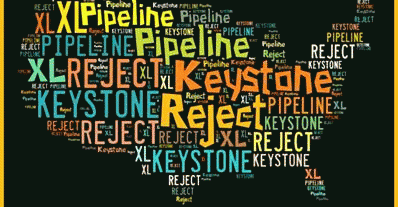Original published at Daily Kos
By Senator Sheldon WhitehouseThe State Department has invited the public to weigh in on the Keystone XL pipeline. The question is whether or not the pipeline is in our national interest.
The answer is no, it is not.
Keystone isn't any normal pipeline. It would pump tar sands oil, one of the dirtiest fuels on Earth. Adding more tar sands oil to our energy mix would accelerate climate change, put our health at risk for generations, and tarnish our international reputation. And we've got until the end of the day on March 7 to tell Secretary John Kerry that it s wrong for America.
Tar sands are a sticky mixture of oil, sediment, and other compounds that requires lots of energy to extract and refine. According to the State Department s analysis of the Keystone project, Canadian tar sands oil produces 17 percent more carbon pollution on its journey from the ground to a tailpipe or smoke stack than the average crude we use.
This extra pollution really adds up. The State Department's calculations show that burning the Keystone tar sands crude instead of average crude could result in up to 1.4 billion metric tons of additional carbon spewed into our atmosphere over the next 50 years.
What does that mean? We can estimate how much carbon-driven climate change will cost society in years to come by adding up its effects on things like agriculture, human health, and property damage from floods. They call this the social cost of carbon. And when you run the numbers on Keystone, you see that tar sands oil could cause up to $128 billion in extra damage from climate change over the pipeline's lifetime. And it's taxpayers, companies, and investors who will shoulder that cost.
There's also the serious toll refining and burning tar sands oil takes on our health. Senator Barbara Boxer and I just met with doctors, researchers, and people who live near tar sands mining operations and refineries to discuss the health problems they see there. They described troubling rates of health risks like asthma, lung disease, cancer, and heart disease.
Beyond Keystone's costs to our economy and health is the real cost of failing to lead the charge on climate change. Last year, President Obama's Climate Action Plan set the goal of galvanizing international action to significantly reduce emissions. That means doing the hard work of convincing the international community to cut carbon pollution. Allowing Keystone to pollute our air and harm our businesses and communities for generations would only discourage the sort of action the President called for.
So no, this isn't just any old pipeline, and it's definitely not in our national interest. I hope you will send your own message telling Secretary Kerry and the President to recognize this and reject Keystone. If they do, they will send the world a message: that America is serious about climate change.
U.S. Senator Sheldon Whitehouse (D-RI) is Chairman of the Senate Environment and Public Works Subcommittee on Clean Air and Nuclear Safety.





